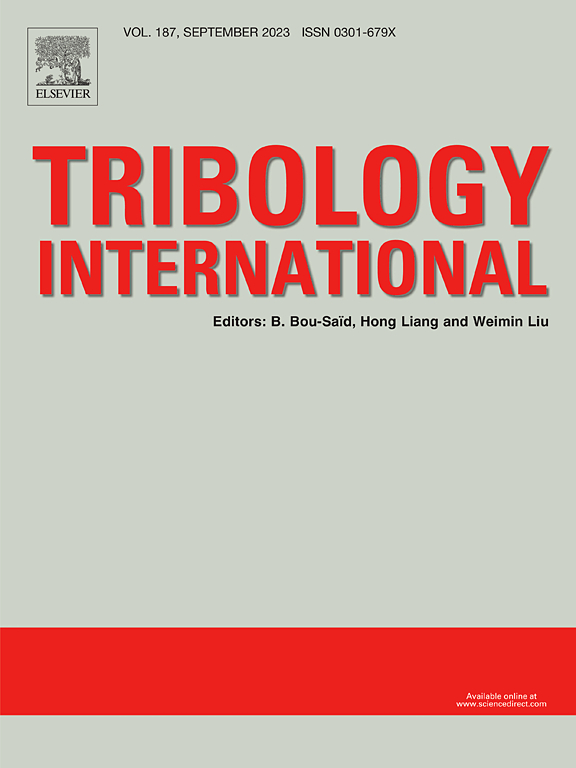Mechanical properties of CoCrFeNi-X (X = Ti,Sn) high entropy alloy and tribological properties in simulated seawater environment
IF 6.1
1区 工程技术
Q1 ENGINEERING, MECHANICAL
引用次数: 0
Abstract
Five multimajor element CoCrFeNi-X(X = Ti,Sn) high entropy alloys (HEA) were prepared by vacuum hot press sintering. The phase composition, mechanical properties and tribological properties of CoCrFeNi-X(X = Ti,Sn) alloys in simulated seawater were investigated. The phase structure of CoCrFeNiTi high-entropy alloy is solid solution FCC phase, R phase, σ phase, and Laves phase. But after addition Sn elements, the phase structure become the FCC phase and Ni-Sn solid solution phase. CoCrFeNiTi alloy has lower density (7.17 g/cm3) and higher hardness (750 HV) than that of CoCrFeNiSn. The compressive yield strength of CoCrFeNiTi HEA is better than CoCrFeNiSn HEA. The CoCrFeNiSn high-entropy alloys showed lower wear rates. The main reason is that SnO2 is generated on the wear scar surface, which has good wetting and corrosion inhibition effects, so CoCrFeNiSn HEA shows better wear resistance in simulated seawater. The main wear mechanism of the CoCrFeNiSn HEA is abrasive wear, oxidative wear, exfoliation wear and corrosive wear.
CoCrFeNi-X (X = Ti,Sn) 高熵合金在模拟海水环境中的机械性能和摩擦学性能
通过真空热压烧结法制备了五种多主量元素 CoCrFeNi-X(X = Ti,Sn)高熵合金(HEA)。研究了模拟海水中 CoCrFeNi-X(X = Ti,Sn) 合金的相组成、力学性能和摩擦学性能。CoCrFeNiTi 高熵合金的相结构为固溶体 FCC 相、R 相、σ 相和 Laves 相。但加入锡元素后,相结构变为 FCC 相和 Ni-Sn 固溶相。与 CoCrFeNiSn 相比,CoCrFeNiTi 合金的密度(7.17 g/cm3)更低,硬度(750 HV)更高。CoCrFeNiTi HEA 的抗压屈服强度优于 CoCrFeNiSn HEA。CoCrFeNiSn 高熵合金的磨损率较低。主要原因是磨损痕表面生成了 SnO2,具有良好的润湿和缓蚀效果,因此 CoCrFeNiSn HEA 在模拟海水中表现出更好的耐磨性。CoCrFeNiSn HEA 的主要磨损机理是磨料磨损、氧化磨损、剥离磨损和腐蚀磨损。
本文章由计算机程序翻译,如有差异,请以英文原文为准。
求助全文
约1分钟内获得全文
求助全文
来源期刊

Tribology International
工程技术-工程:机械
CiteScore
10.10
自引率
16.10%
发文量
627
审稿时长
35 days
期刊介绍:
Tribology is the science of rubbing surfaces and contributes to every facet of our everyday life, from live cell friction to engine lubrication and seismology. As such tribology is truly multidisciplinary and this extraordinary breadth of scientific interest is reflected in the scope of Tribology International.
Tribology International seeks to publish original research papers of the highest scientific quality to provide an archival resource for scientists from all backgrounds. Written contributions are invited reporting experimental and modelling studies both in established areas of tribology and emerging fields. Scientific topics include the physics or chemistry of tribo-surfaces, bio-tribology, surface engineering and materials, contact mechanics, nano-tribology, lubricants and hydrodynamic lubrication.
 求助内容:
求助内容: 应助结果提醒方式:
应助结果提醒方式:


